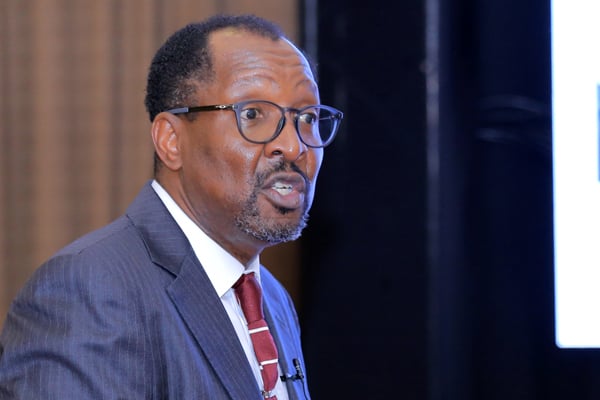Prime
Over 17.5 million workers have no social security – NSSF

Mr Patrick Ayota, the managing director of NSSF. PHOTO/ISAAC KASAMANI
What you need to know:
Over 83 percent of NSSF members have less than Shs10 million in saving balance and on average, these savers earn Shs250,000 per month.
Statistics released by the National Social Security Fund (NSSF) have indicated that out of a working population of 20.5 million in Uganda, only 14.6 percent are covered by any form of social security, leaving millions exposed.
This means that only 2.993 million Ugandans have social protection, leaving the majority of workers in Uganda, approximately 17.7million people vulnerable to poverty, inequality and social exclusion across the life cycle.
The NSSF statistics released in Kampala yesterday further revealed that there are only 800,000 companies registered with NSSF and the compliance rate of employers remitting employees’ savings to the NSSF is at 57 per cent.
Ms Faith Kimuli, the legal and manager enforcement and debt recovery unit at NSSF told a sector wide workshop to enhance social protection in Uganda that the total labour force (14-64 years) is 23.5 million.
The workshop was organised by NSSF in partnership with Ministry of Gender, Labour and Social development, Ministry of Finance Planning and Economic Development and the Ministry of ICT and Guidance.
“Total registered employers (Active and Dormant 88,210, NSSF members (Active and Dormant 2.3 million),” Ms Kimuli said.
The managing director of NSSF, Mr Patrick Ayota said: “Our data shows that over 83 percent of NSSF members have less than Shs10 million in saving balance and on average these savers earn Shs250,000 a month. The low savings are attributed to non-compliant employers and low wages earned. At a national level, our savings are 11 percent of the GDP,” he said.
Mr Ayota revealed that 182,316 members which constitutes only 12 per cent has saving balance in the range of Shs10 to Shs50 million members, 36,405 which constitutes 2 per cent has saving balance of Shs50 million to Shs100 million and those with more than 100 million constitutes of 34,955 members that also forms 2 per cent.
Mr Ayota explained that high formal unemployment and large informal unemployment, low wages, cheating employers and enforcement mechanisms is still a problem in Uganda.
“And yet we are living longer, the life expectancy of a Ugandan is 63 and increasing,” he said.
Mr Ayota added: “How will we live? How will this impact us? We are all responsible. We must all encourage savings if we are to accelerate the entry of Uganda into the club of Africa Economic Giants. We boldly lay out Vision 2035 and strategic objectives are to have 50 percent of the working Ugandans are saving with NSSF Estimated at 15 million, member ratification is maintained at 95 percent, leading balance sheet growth to Shs50 trillion.”
During the sensitisation meeting which was mainly for the telecommunication and technology sector, Mr Ayota said Employers in the telecommunication and technology sector have be given until February 1, 2024 to register their employees and remit their social security contributions to the NSSF and it implies that the telecommunication and technology sector have been given amnesty of six months to register their employees.
Overall, the move aims at increasing the number of registered employees remitting their savings with NSSF companies’ compliance levels, while failure to do so they will be subjected to penalties.
Responding to the NSSF decision, the Minister of state for National Guidance, Mr Godfrey Kabyanga asked the sector players to fulfil their social security obligations within the amnesty period and negotiate a convenient payment plan with the NSSF in case of challenges, to avoid hefty penalties.
CHALLENGES
The Minister Gender, Labour and Social Development, Ms Betty Amongi, said Uganda has a lot more informal work in the economy-which means a lot of the work is not captured via formal monetary means.
“Secondly, it also means that Uganda has a very low adoption rate of technology in work –another reason for partnering with the Ministry of ICT,” she said.




